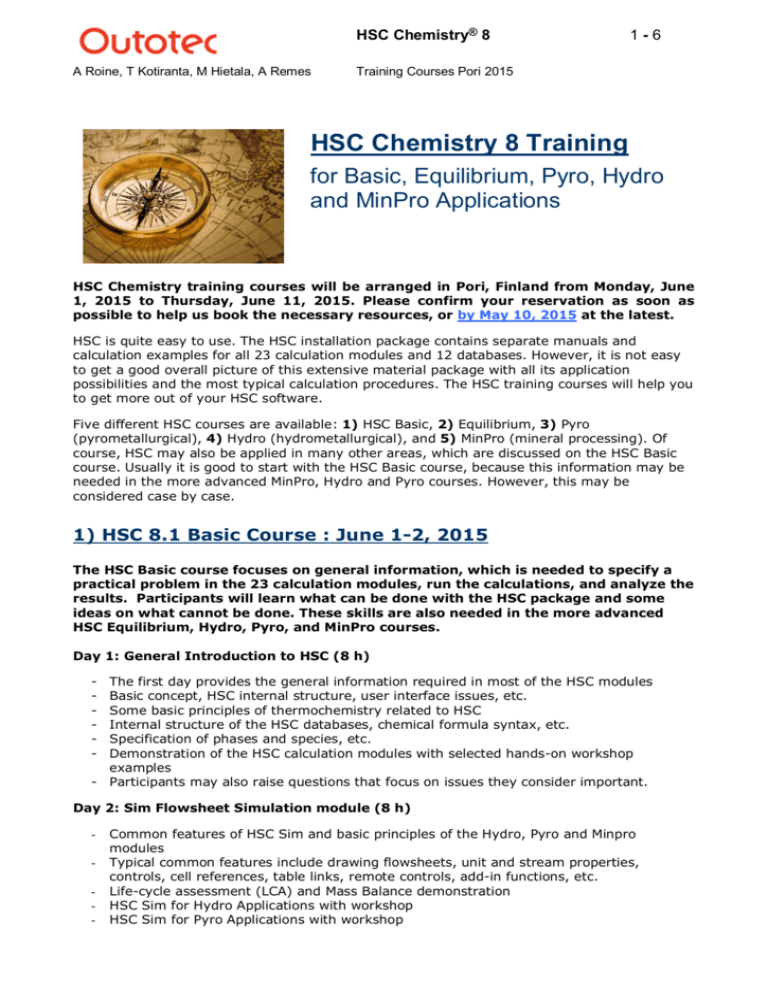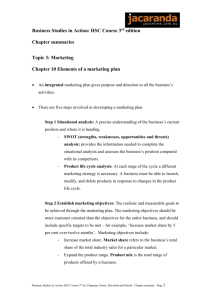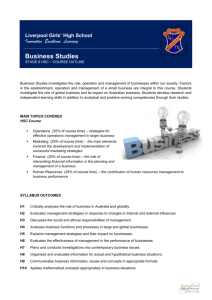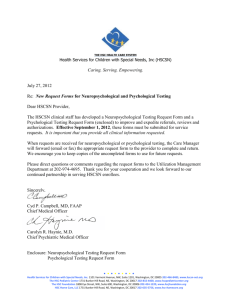HSC Chemistry 8 Training
advertisement

HSC Chemistry® 8 A Roine, T Kotiranta, M Hietala, A Remes 1-6 Training Courses Pori 2015 HSC Chemistry 8 Training for Basic, Equilibrium, Pyro, Hydro and MinPro Applications HSC Chemistry training courses will be arranged in Pori, Finland from Monday, June 1, 2015 to Thursday, June 11, 2015. Please confirm your reservation as soon as possible to help us book the necessary resources, or by May 10, 2015 at the latest. HSC is quite easy to use. The HSC installation package contains separate manuals and calculation examples for all 23 calculation modules and 12 databases. However, it is not easy to get a good overall picture of this extensive material package with all its application possibilities and the most typical calculation procedures. The HSC training courses will help you to get more out of your HSC software. Five different HSC courses are available: 1) HSC Basic, 2) Equilibrium, 3) Pyro (pyrometallurgical), 4) Hydro (hydrometallurgical), and 5) MinPro (mineral processing). Of course, HSC may also be applied in many other areas, which are discussed on the HSC Basic course. Usually it is good to start with the HSC Basic course, because this information may be needed in the more advanced MinPro, Hydro and Pyro courses. However, this may be considered case by case. 1) HSC 8.1 Basic Course : June 1-2, 2015 The HSC Basic course focuses on general information, which is needed to specify a practical problem in the 23 calculation modules, run the calculations, and analyze the results. Participants will learn what can be done with the HSC package and some ideas on what cannot be done. These skills are also needed in the more advanced HSC Equilibrium, Hydro, Pyro, and MinPro courses. Day 1: General Introduction to HSC (8 h) - The first day provides the general information required in most of the HSC modules Basic concept, HSC internal structure, user interface issues, etc. Some basic principles of thermochemistry related to HSC Internal structure of the HSC databases, chemical formula syntax, etc. Specification of phases and species, etc. Demonstration of the HSC calculation modules with selected hands-on workshop examples - Participants may also raise questions that focus on issues they consider important. Day 2: Sim Flowsheet Simulation module (8 h) - Common features of HSC Sim and basic principles of the Hydro, Pyro and Minpro modules Typical common features include drawing flowsheets, unit and stream properties, controls, cell references, table links, remote controls, add-in functions, etc. Life-cycle assessment (LCA) and Mass Balance demonstration HSC Sim for Hydro Applications with workshop HSC Sim for Pyro Applications with workshop HSC Chemistry® 8 A Roine, T Kotiranta, M Hietala, A Remes 2-6 Training Courses Pori 2015 Target of the Basic Course The majority of HSC users utilize perhaps only 1-2 of the HSC calculation modules. This course will help users to understand the capabilities of all 23 calculation modules and 12 databases. This course also provides an understanding of the potential applications of HSC. The target of the Basic HSC Course is to teach the participants what can be done with the HSC package and what cannot be done. The course will focus on the most common questions and problems raised by HSC users over the last few years. This course gives an overview of the basic HSC operation principles and the major procedures needed to solve more complicated problems with the HSC software. The course will also illustrate thermochemistry application possibilities in practical problems. The Basic Course is intended for beginners and intermediate users. However, even more advanced users may find it useful, because they will have the opportunity to raise questions concerning more difficult issues. Lecturers: Dr. Antti Roine, Lauri Mäenpää, Matti Hietala Antti has worked with HSC modules and databases for some 30 years. Lauri and Matti have worked as technical advisors on the HSC 8 development project; their area of expertise is physical chemistry. 2) HSC Equilibrium Module Applications : June 3, 2015 This one-day course focuses on HSC Equilibrium module applications. Equilibrium calculations offer a practical way to observe the effects on product composition of process variables, such as temperature and amounts of raw materials. Day 1: HSC Equilibrium Module Applications - Theory and general issues Specification of chemical system and raw materials Diagrams High temperature applications with workshop Aqua module, water solution properties, Pitzer models Water solution applications with workshop Cell calculations Transitory Evaporation, Open Atmosphere and Target calculations Creation of solution model DLL files Target of the Equilibrium Course The Equilibrium module is one of the most commonly used HSC tools, because it can be applied to many different areas. The course covers a general introduction to the Equilibrium module with several demonstrations and provides an understanding of the potential applications of the Equilibrium module. The target of this course is to acquire the versatile skills required to use and create Equilibrium applications and analyse the results. Lecturer: Dr. Petri Kobylin Petri has many years of experience of water solutions and equilibrium calculations. He has worked as a technical advisor in HSC 8 Equilibrium module development. HSC Chemistry® 8 A Roine, T Kotiranta, M Hietala, A Remes 3-6 Training Courses Pori 2015 3) HSC Sim Pyro Applications : June 4 - 5, 2015 This two-day course focuses on HSC Sim distribution mode applications. Typically, these are used to simulate pyrometallurgical processes, but they may also be applied in many other areas. Day 1: Sim Flowsheet Distribution Mode Introduction - Basic use of HSC Sim Drawing a flowsheet with HSC Sim Data needed for building up a simulation based on distribution models Using controls and model tools. Excel and DLL type unit operations. Checking and identifying errors Demonstrations with several Sim distribution mode example cases Sim Flowsheet workshop with distribution models Day 2: Sim Flowsheet Distribution Mode Workshops - Life-cycle assessment (LCA) and Mass Balance workshop Several examples of different types of distribution unit operation. Target of the Pyro Course The course covers a general introduction to the Sim Flowsheet module with several demonstrations and provides an understanding of the potential applications of the Sim Distribution mode. The target of this course is to acquire the versatile skills to use and create Sim Distribution mode applications and analyse the results. Lecturers: Matti Hietala, Lauri Mäenpää Matti has worked as a technical advisor in HSC 8 Sim module development and as a physical chemistry specialist. Lauri has worked as a technical advisor in HSC 8 development and as a physical chemistry specialist. 4) HSC Sim Hydro Applications : June 8-9, 2015 This two-day course focuses on HSC Sim reaction mode applications. Typically, these are used to simulate hydrometallurgical processes, but they may also be applied in many other areas. Day 1: Sim Flowsheet Reactions Mode Introduction (8 h) - Basic use of HSC Sim Sim internal structure, user interface issues, tools, specified working methods, etc. Drawing a flowsheet with HSC Sim Data necessary for building up a simulation Using controls and model wizards Checking and identifying errors Demonstrations with several Sim reaction mode example cases. Day 2: Sim Flowsheet Workshop (8 h) - The second day focuses on workshops, which provide information on drawing flowsheets, creating models, testing simulations, and analysing the results - Workshop with simple reaction mode examples - Workshop with participants’ own processes. HSC Chemistry® 8 A Roine, T Kotiranta, M Hietala, A Remes 4-6 Training Courses Pori 2015 Target of the Hydro Course The course covers a general introduction to the Sim Flowsheet module with several demonstrations and provides an understanding of the potential applications of the Sim Reactions mode. The target of this course is to acquire the versatile skills to use and create Sim Reactions mode applications and analyse the results. Lecturer: Tuukka Kotiranta, Petri Kobylin Tuukka has specified many of the HSC Sim software features and properties. He has more than ten years’ experience of hydrometallurgical processes and modeling applications. Petri has many years’ experience of water solutions and equilibrium calculations. 5) HSC Mineral Processing Course : June 10-11, 2015 Introduction, basic principles and features of the Sim flowsheet module - HSC general and modules - Basic applications of HSC Sim, differences between Hydro, Pyro and Minerals Processing simulations Working with an existing simulation - Structure of HSC in Particles Mode - Basic tools of HSC Creating your own first simulation - What data are needed for creating a simulation in minerals processing? Drawing the flowsheet, menus, drawing tools, properties tabs, etc. Describing mineralogy (Mineral setup) Element to mineral conversion Using model wizards Checking and identifying errors Modifying the basic simulation model - Model parameters Controls Scenarios Alternative flowsheets This course gives an overview of the basic HSC Sim operating principles and the major procedures required to solve more complicated problems. Participants will learn what can be done with the HSC package and some ideas on what cannot be done. The course will also illustrate the potential applications of HSC Sim mineral processing by means of practical problems. Participants may test calculation examples on their PC, ask questions at any time or just follow the presentations. Target of the Hydro Course The course covers a general introduction to the Sim Flowsheet module with several demonstrations and provides an understanding of the potential applications of the Sim Reactions mode. Lecturers: Dr. Antti Remes, Matti Hietala Antti has been working with mineral processing applications for more than 10 years. Matti has worked as a technical advisor in HSC 8 Sim module development HSC Chemistry® 8 A Roine, T Kotiranta, M Hietala, A Remes 5-6 Training Courses Pori 2015 Booking and Other Conditions All participants should bring along their own laptops. Participants need full admin rights for their computers, because the latest HSC version will be installed on the laptops. A mouse is recommended - it will help a lot in flowsheet drawing. Participants do not need their own HSC license; a temporary HSC license and installation will be provided on the course. Participants may test calculation examples on their PC, ask questions at any time, or just follow the presentations. Language: The official language of the seminar is English. Daily outline of course schedule: 8:30 registration starts, 9:00 course starts, 10:30-10:45 coffee break, 12:00-13:00 lunch, 15:00-15:15 coffee break, 17:00 course ends. Prices: 500 EUR per day per participant (VAT 0%). It is possible to participate for one day only. However, it is recommended to take the whole course, because this will help you get the maximum benefit from HSC. The total fixed price of the course covers: - HSC Basic, Equilibrium, Hydro, MinPro or Pyro course Printed course material for all the participants Course workshop cases in printed and electronic form 14-day license for latest version of HSC for all participants Course certificates (will be sent after the course to the participants) Lunches and refreshments. Location: Outotec Research Center Auditorium Kuparitie 10, Pori, Finland Booking: Please fill in and sign the Booking Form and email or fax it to: Ms Satu Laakso: Outotec, Research Center P.O. Box 69, FIN-28101 Pori, Finland Tel: +358 - 20 - 529 3002, Fax: +358 - 20 - 529 3201 satu.laakso@outotec.com Email: Payment may be made by bank transfer or by credit card (VISA, MasterCard, Eurocard or Amex). Note: No refunds will be made for cancellations, unless the whole course is cancelled. Bank Transfer Information: (for purchase orders) Credit Card Information: Outotec (Finland) Oy (VAT FI 15386292) Bank: Nordea Bank Finland Plc Address: Aleksanterinkatu 36B, Helsinki, 00020 Nordea Account (IBAN): FI 8215 7130 0001 6999 Swift: NDEAFIHH Number: Expiry Date: CVV/CVC (3 digits): HSC Chemistry® 8 A Roine, T Kotiranta, M Hietala, A Remes Location Training Courses Pori 2015 Outotec Research Center Kuparitie 10 FI-28101 Pori, Finland Hotels, Flights and Local Info Please make your own hotel and flight reservations. Here are some options: http://www.sokoshotels.fi/en/hotels/pori/ http://www.scandichotels.com/en/Hotels/Countries/Finland/Pori/Hotels/Scandic-Pori/ http://www.finavia.fi/en/pori/ http://www.nextjet.se/en http://www.pori.fi/en/index.html For further information: http://www.outotec.com/HSC http://www.hsc-chemistry.com/ 6-6







